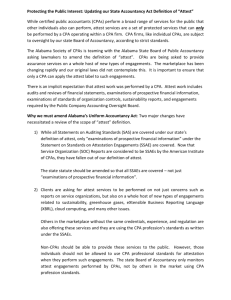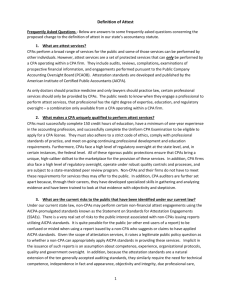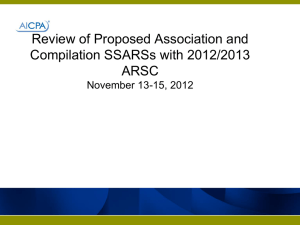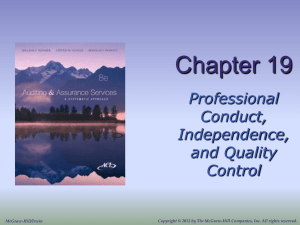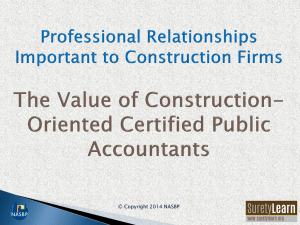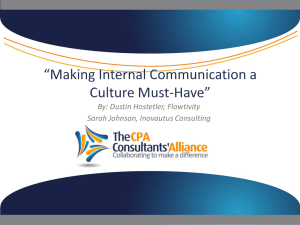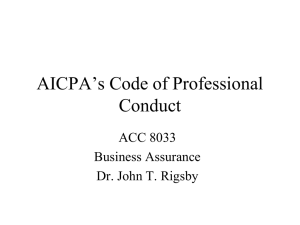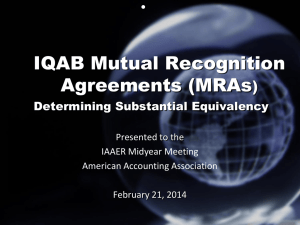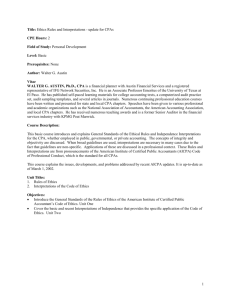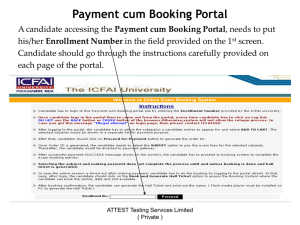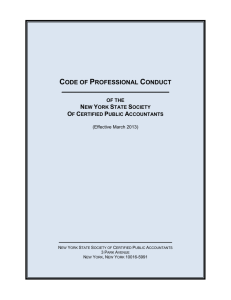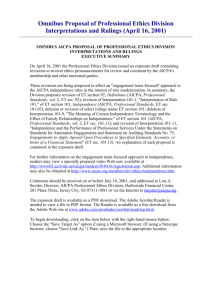Definition of Attest Frequently Asked Questions
advertisement
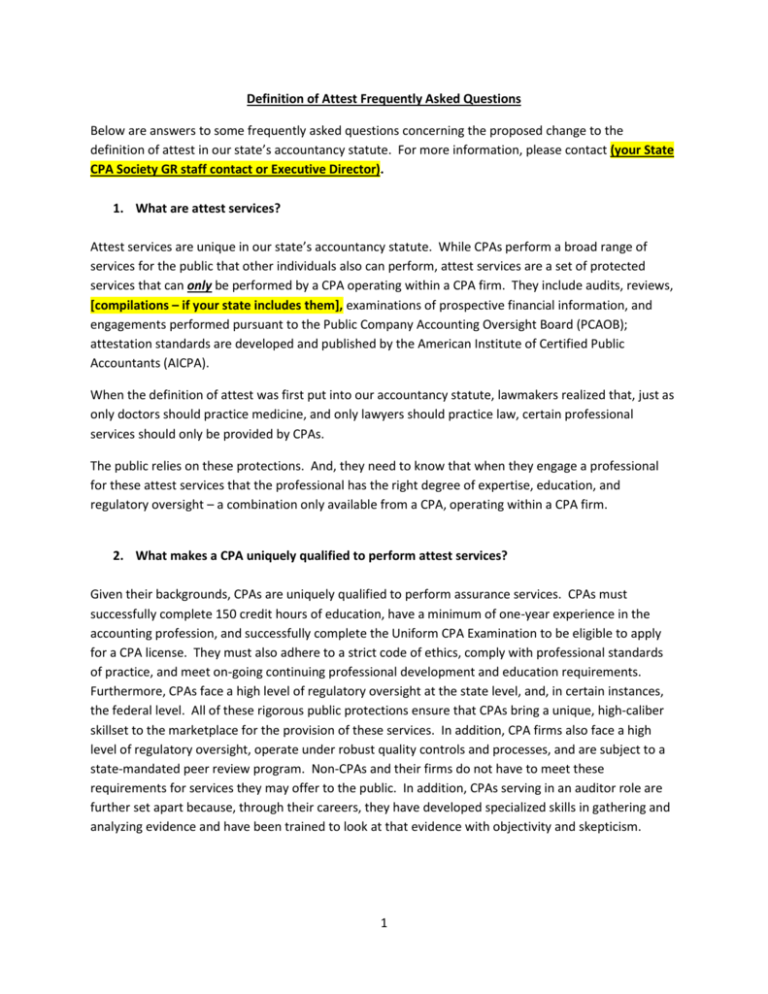
Definition of Attest Frequently Asked Questions Below are answers to some frequently asked questions concerning the proposed change to the definition of attest in our state’s accountancy statute. For more information, please contact (your State CPA Society GR staff contact or Executive Director). 1. What are attest services? Attest services are unique in our state’s accountancy statute. While CPAs perform a broad range of services for the public that other individuals also can perform, attest services are a set of protected services that can only be performed by a CPA operating within a CPA firm. They include audits, reviews, [compilations – if your state includes them], examinations of prospective financial information, and engagements performed pursuant to the Public Company Accounting Oversight Board (PCAOB); attestation standards are developed and published by the American Institute of Certified Public Accountants (AICPA). When the definition of attest was first put into our accountancy statute, lawmakers realized that, just as only doctors should practice medicine, and only lawyers should practice law, certain professional services should only be provided by CPAs. The public relies on these protections. And, they need to know that when they engage a professional for these attest services that the professional has the right degree of expertise, education, and regulatory oversight – a combination only available from a CPA, operating within a CPA firm. 2. What makes a CPA uniquely qualified to perform attest services? Given their backgrounds, CPAs are uniquely qualified to perform assurance services. CPAs must successfully complete 150 credit hours of education, have a minimum of one-year experience in the accounting profession, and successfully complete the Uniform CPA Examination to be eligible to apply for a CPA license. They must also adhere to a strict code of ethics, comply with professional standards of practice, and meet on-going continuing professional development and education requirements. Furthermore, CPAs face a high level of regulatory oversight at the state level, and, in certain instances, the federal level. All of these rigorous public protections ensure that CPAs bring a unique, high-caliber skillset to the marketplace for the provision of these services. In addition, CPA firms also face a high level of regulatory oversight, operate under robust quality controls and processes, and are subject to a state-mandated peer review program. Non-CPAs and their firms do not have to meet these requirements for services they may offer to the public. In addition, CPAs serving in an auditor role are further set apart because, through their careers, they have developed specialized skills in gathering and analyzing evidence and have been trained to look at that evidence with objectivity and skepticism. 1 3. What are the current risks to the public that have been identified under our current law? Under our state law, non-CPAs may currently perform certain attest engagements and some are doing so using the AICPA-promulgated standards known as the Statement on Standards for Attestation Engagements (SSAEs). There is a very real set of risks to the public interest associated with non-CPAs issuing reports utilizing AICPA standards. It is quite possible for the public (or other end-users of a report) to be confused or misled when using a report issued by a non-CPA who suggests or claims to have applied AICPA standards. Given the scope of attestation services, it raises a legitimate public policy question as to whether a non-CPA can appropriately apply AICPA standards in providing these services. Implicit in the issuance of such reports is an assumption about competence, experience, organizational protocols and processes, quality and government oversight. In addition, because the attestation standards are a natural extension of the ten generally accepted auditing standards, they similarly require the need for technical competence, independence in fact and appearance, objectivity and integrity, due professional care, adequate planning and supervision, sufficient evidence, appropriate reporting, and the application of professional judgment, all of which are unique hallmarks of a CPA. 4. Why is the [STATE SOCIETY] seeking to change the definition of attest? The marketplace and needs of clients have been changing over the past decade. Indeed, CPAs are increasingly being asked to provide, and have been providing, attest services on a whole host of engagements not originally contemplated by the state attest definition. Examples of such attestation engagements include issuing reports on security and privacy controls, sustainability, greenhouse gas emissions, controls on service organizations, and XBRL-tagged data. In responding to these marketplace needs, CPAs have been able to apply the basic concepts underlying audit and review to these attest services. However, unfortunately, all of these services can also currently be performed by non-CPAs using the accounting profession’s standards. In addition to concerns about competency by non-CPAs using CPA standards, there is another risk to the definition of attest in our state law. Despite the narrowly targeted focus of the definition of attest in our law, the scope of the definition of attest can change unexpectedly through a change in the referenced AICPA standards. Indeed, that is exactly what happened relatively recently when the Statement on Auditing Standards (SAS) 70, Reporting on Controls at a Service Organization, was rewritten and reissued as SSAE 16. This reclassification of a standard by the AICPA had the unintended effect of moving the standard out from under our state’s definition of attest. There is a risk that a further reclassification of profession standards for technical reasons unrelated to our state laws could inadvertently make their performance available to anyone irrespective of their qualifications, training, education, and background. We need to close this potential loophole. 5. What is the current definition of attest in our state accountancy law? The term “attest” as defined in our state law is: PLACEHOLDER: THIS IS UAA LANGUAGE. STATE SOCIETIES WILL NEED TO INSERT THEIR 2 RELEVANT STATUTE PROVISION HERE Section 3 (b) “Attest” means providing the following financial statement services: (1) any audit or other engagement to be performed in accordance with the Statements on Auditing Standards (SAS); (2) any review of a financial statement to be performed in accordance with the Statements on Standards for Accounting and Review Services (SSARS); (3) any examination of prospective financial information to be performed in accordance with the Statements on Standards for Attestation Engagements (SSAE); and (4) any engagement to be performed in accordance with the standards of the PCAOB The standards specified in this definition shall be adopted by reference by the [state] Board pursuant to rulemaking and shall be those developed for general application by recognized national accountancy organizations, such as the AICPA, and the PCAOB. 6. How does the [STATE SOCIETY]’s proposal to amend the definition of attest guarantee that other service providers will be able to compete in the marketplace? The proposal before the legislature would require that non-CPAs cease providing reports indicating they have used AICPA professional standards. However, non-CPAs will not be prohibited from developing or using alternative standards. Clients and the third parties who rely on these attest reports (e.g. financial institutions, shareholders) are free to decide which service providers and standards they trust in the marketplace. 7. What does our State Board of Accountancy say about this proposed change? What are the AICPA’s and the National Association of State Boards of Accountancy’s (NASBA) position on this proposal? (Insert an appropriate paragraph here after consulting with your State Board of Accountancy) The AICPA and NASBA have taken steps to amend their model state accountancy act, the Uniform Accountancy Act (UAA), to include this revised definition of attest. The UAA is often a reference point for state CPA societies, state boards of accountancy, and state lawmakers as they seek to revise and update their states’ respective accountancy laws. The joint actions by these two national organizations show their mutual concern about protecting the public interest in our state and across the country. Updated: May 2014 3
